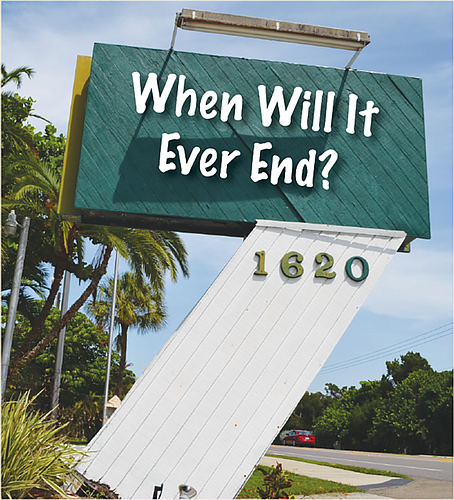- April 18, 2024
-
-
Loading

Loading

Longboat Key Vice Mayor Terry Gans has it right. Asked about some Longboat residents who are unhappy with the town’s recent switch to a new police dispatch system, Gans said: “I’m not surprised, because in any walk of life, anything you get into, someone’s liable not to be happy with it.”
That’s the nature of law making … and the democratic process. One group wins, another loses. And the losers typically are unhappy.
That’s the way it is on Longboat today. A lot of Longboat Key residents are unhappy — not with the dispatch system, but with the methodology the town used to determine how much each property owner will pay to convert to underground utility lines in Longboat’s neighborhoods.
It was only a matter of time:
Even though town commissioners vetted in multiple public hearings what the costs will be and the methodologies used to determine each Longboat property owner’s assessments, and even after Longboat voters approved the issuance of $23.8 million in bonds for the project, ever since the vote, the displeasure has been growing hotter.
Last week, the teapot whistled. Over the past month, individuals from a half-dozen neighborhoods began discussions about formal steps to oppose and change the town’s methodologies for determining the neighborhood assessments. You know the effort is serious because one of the neighborhoods enlisted Sarasota lawyer Robert Lincoln.
Not only is Lincoln an owner at Club Longboat, one of the unhappy homeowner associations, but he was the lead lawyer for the Islandside Property Owners Coalition (IPOC) when it defeated the Longboat Key Club and Resort’s $400 million expansion proposal six years ago.
This is a conundrum for the Town Commission and town administration. They made good-faith efforts to create an equitable methodology for assessing property owners and followed the legal parameters required for such a process. They vetted the issues in public hearings. And then 61% of the votes cast in March favored the proposal.
Commissioners knew many neighborhoods slated to pay the highest assessments remained unhappy. Even so, Gans said last week during a commission meeting: “I’m not sure there is a substantial modification at the end of the day that is any fairer than where we are.”
Gans may be 100% correct.
Nonetheless, when residents have seen the wide discrepancy in pricing in certain neighborhoods, they intuitively believe there must be a better way. The Club Longboat example, cited most often, is the most striking. Florida Power & Light Co. quoted the club $25,000 to bury its utilities, and yet under the town’s neighborhood assessments, Club Longboat would pay $300,000. All because of its location within 55 feet of a power pole.
The same for Bayport Beach and Tennis Club and other neighborhoods. It already has underground utility lines, and yet because two of its buildings fall within the magic 55 feet of overhead power lines, property owners in those buildings will pay higher assessments than their fellow Bayport neighbors.
With these discrepancies, neighborhood homeowner associations obviously have become poised to challenge the town’s assessments in the courts if changes are not made.
Town commissioners took the right approach at last week’s commission meeting, asking the town administration and town utility consultants to study what changes could be made. Tweaking the assessments is not likely to be enough.
Indeed, perhaps the commission and town administration might go two steps further: Assign Assistant Town Manager Michael Hein to compile a comprehensive comparison of how other municipalities assessed or taxed their property owners for underground utility projects — and the consequences of their methodologies. Second, solicit alternative plans from the Longboat Key neighborhood associations objecting to the plan. Don’t just complain, offer a solution.
The town has the time — until September 2017 — to set the neighborhood assessments. Given what is at stake — the cost of the underground project and the likelihood of divisive, costly legal battles — the town should do more than tweak. It should make a convincing extra effort.
COLONY-UNICORP DEAL: ONE SMALL STEP
Don’t read too much into the vote of the Colony Beach and Tennis Resort Association board’s vote to pursue a development agreement with Orlando-based Unicorp National Developments Inc.
While everyone would like to be optimistic that this is a significant step toward redevelopment, it’s just one of many, many steps still to come. For instance:
That would require approval from Longboat voters. And you can be sure neither commissioners, the town planning staff nor residents would embrace expanding the Colony’s density by half when everyone is on edge about traffic.
If the town rejects the increased density, Unicorp would go back to start — revise its plans or bail out.
As much as we all wish the resurrection of the Colony is approaching reality, sorry to burst the bubble: It’s still a long way off.
BLUE LIVES MATTER
Even if the ranking as Florida’s safest small city comes from one of those “big-data” digital companies (ValuePenguin.com), the 2016 ranking provides reassurance.
Longboat Key residents already know they live in an incredibly safe place. You can attribute that to geography (difficult to get access and its gated neighborhoods); its people (law-abiding, affluent); and its police department.
In this day of little appreciation for police, we’ll emphasize: Longboat’s men and women in blue do a fantastic job. Blue Lives Matter!